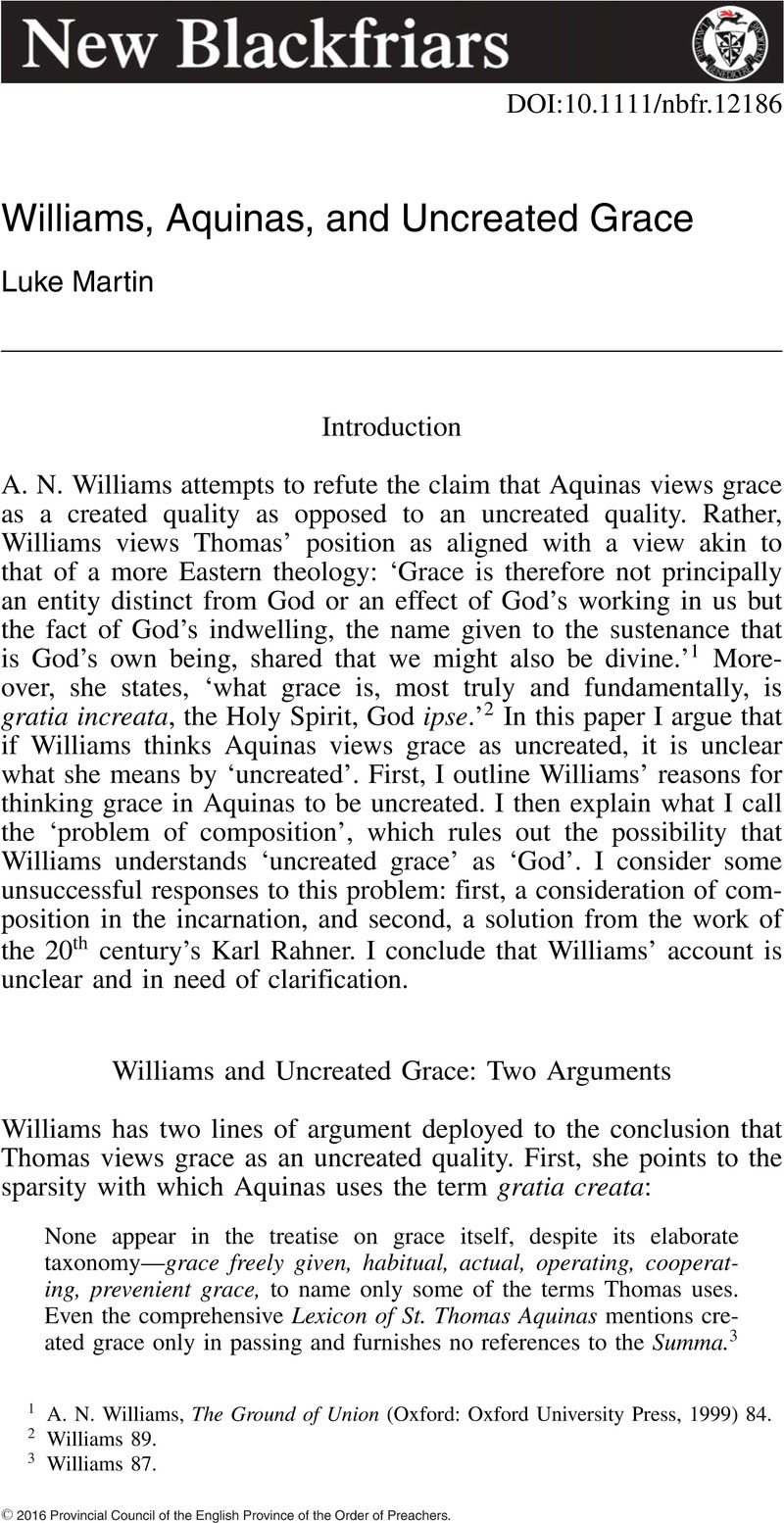Article contents
Williams, Aquinas, and Uncreated Grace
Published online by Cambridge University Press: 01 January 2024
Abstract

- Type
- Original Article
- Information
- Copyright
- Copyright © 2016 Provincial Council of the English Province of the Order of Preachers
References
1 Williams, A. N., The Ground of Union (Oxford: Oxford University Press, 1999) 84CrossRefGoogle Scholar.
2 Williams 89.
3 Williams 87.
4 Williams 87.
5 For an explanation of Thomas Doctrine of Divine Simplicity see Pasnau, and Shields, , The Philosophy of Aquinas (Oxford: Oxford University Press, 2004)Google Scholar. Ch. 4.
6 Williams 40.
7 Williams 54.
8 Williams states: ‘The difference Aquinas is pointing to, then, lies not in any essential distinction between love and goodness themselves but in the difference between their mode of existing in God and their mode of existing in us, which reduces once again to the distinction between creature and Creator.’ 84.
9 L., Mascall, E. Via Media: an essay in theological synthesis (London: Longmans, 1956)Google Scholar.
10 Williams 62.
11 Williams 84.
12 Williams 84.
13 All references to Aquinas’ work are to the online edition of the translation by the Father of the English Dominican Order (available here: http://www.newadvent.org/summa/index.html). In this case, ST III q2 a4.
14 ST III q2 a4.
15 Rahner's philosophy dissertation Geist in Welt is an interpretation of Thomas Aquinas’ epistemology influenced by the transcendental Thomism of Joseph Marechal and the existentialism of Martin Heidegger.
16 K., Rahner, Foundations of Christian Faith: an Introduction to the Idea of Christiantiy (London: Darton, Longman and Todd, 1978). 119Google Scholar.
17 Notice how this parallels Aquinas, idea the grace is an accidental quality of a person. Rahner does not use the language of God uniting himself as ‘accidental form’ of a person, rather this is Kilby's interpretation of Rahner, partly based on Rahner's proposal that God ‘makes himself the innermost constitutive element of man.’
18 Kilby, K. Karl Rahner: Theology and Philosophy (London: Routledge, 2004)CrossRefGoogle Scholar. Ch. 4.
19 Foundations 121. Italics mine.
20 Foundations 121. Italics mine.
21 Kilby 56.
22 ST 1a q3 a8.
23 ST 1a q3 a8.
24 See Aristotle, , translated by Ross, W. D. The Works of Aristotle (Oxford: Oxford University Press, 1928)Google Scholar. Ch. 6.
25 See Pasnau, and Shields, , The Philosophy of Aquinas (Oxford: Oxford University Press, 2004)Google Scholar. Ch. 3.
26 ST III q2.
27 Williams 54.
28 Williams 54.
29 Williams 55.
30 I use ‘mode talk’ as a label for Williams’ view (explained above) that the purpose of the uncreated/created distinction is not to suggest that there is a grace that is something other than God, but to express the mode in which God is present: in ‘created grace’, God is present to His creatures in a way that respects their creaturely limitations.
31 Williams 89.
- 1
- Cited by


